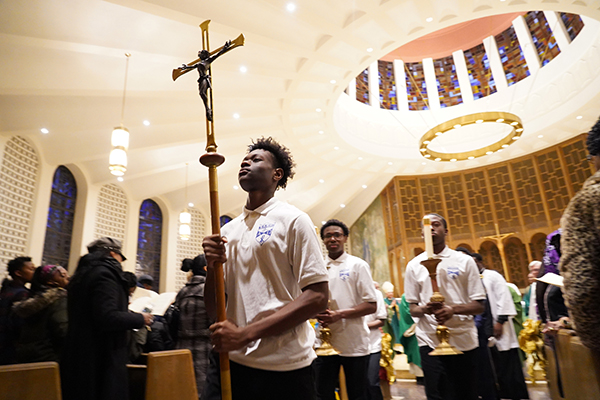
MANHATTAN — In the weeks following the death of George Floyd, people of all backgrounds have taken to social media, their social circles, and, despite a pandemic, even the streets to grapple with the realities of how today’s culture impacts the black community.
The Tablet reached out to black Catholic youths in the Diocese of Brooklyn to get their opinion on what it means to be black now and how all Catholics can work to confront “America’s Original Sin.”
Since the coronavirus pandemic began, 22-year-old Peter Damour, Youth Minister of St. Clare Catholic Church in Rosedale, has been hosting Youth Group meetings via Zoom three times a week. He invites the members of his parish to commune, pray the rosary, and discuss the difficult moments they encounter in their daily lives.
Last Friday, the group gathered to discuss Floyd’s death and how it impacted them personally.
“I think everyone is just frustrated,” Damour explained. “For a long time, it’s [been] a never-ending cycle. … The many that I’ve spoken to are just sick and tired of it.”
One ministry member, a seventh-grader, said she “feels bad for her generation, the younger generation, and the future,” citing moments like Floyd’s death as traumatizing.
Another member expressed that “it’s something that’s been bothering African Americans way before I was born.”
“Racism is America’s Original Sin,” Damour said. “Some people can be racist, and not even realize it.” Damour has been using this time to read, learn, and educate himself on how to move the civil rights movement forward but ultimately cites his faith as the best way to connect with others on these social issues.
“I think the black community has been trying to inform for all these years,” he explained. “My ancestors had to have been doing the same.”
In today’s times, he feels the learning must move beyond his immediate community and include all of America’s diverse people.
“As a young Black Catholic male, I feel like I can bring the most effective change by joining my Church,” he told The Tablet. “Us being the diocese of immigrants, that’s a blessing and we ought to show the world how to do this.”
For Father Dwanye Davis, pastor of St. Thomas Aquinas Church in Flatlands, these moments bring back memories of “when our Black brothers and sisters were not included. What’s going on, what happened, is wrong.”
“It can’t be a race-thing only,” Father Davis continued. “If we go back to what Pope Francis said to us recently — when we talk about pro-life and we talk about life — we have to talk about inclusion.”
Pope Francis addressed Floyd’s death during a live-stream on June 3, saying that “we cannot tolerate or turn a blind eye to racism and exclusion in any form and yet claim to defend the sacredness of every human life.”
“Any injustices that we see, we should be able to speak out about them,” Father Davis said. “Unfortunately, in the Black community, they do feel that the Church hasn’t al-
ways responded and that leaders are silent.”
For Pope Francis to address what Father Davis describes as a uniquely American problem, “helps Black Catholics to feel like the Church is there with them.”
Both Father Davis and Damour urge living the Scriptures as a way to combat racism and work towards unity.
“All of our brothers and sisters, whether they’re Catholic or not, we can really head towards a direction that’s not only fruitful for Black people but fruitful for humanity,” Damour said.
